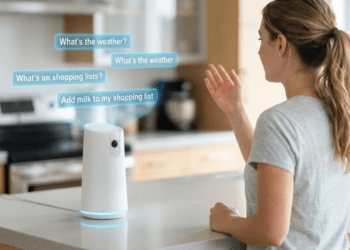A New Era for Google’s AI Assistant

Google has been on a roll with its Gemini. What started as a powerful conversational tool is now transforming into something much bigger. The company recently announced a set of major updates: Gemini Live’s new visual guidance and speech upgrades, and the long-awaited expansion into Nest smart speakers.
This isn’t just a small tweak to an assistant. It’s a reimagining of how AI can live in our homes, on our devices, and in our daily routines. With this move, Google is directly challenging Amazon Alexa and Apple’s Siri in a battle for the smart home of the future.
What Is Gemini Live?
Gemini Live is Google’s interactive layer for Gemini. Instead of static text responses, it brings real-time conversations, visual cues, and smarter contextual awareness. Imagine asking your phone or speaker for help, and instead of a robotic voice spitting out facts, you get something closer to a natural dialogue.
The update adds visual guidance, which means Gemini can walk you through tasks step by step whether that’s cooking a recipe, setting up Wi-Fi, or troubleshooting your smart thermostat. Paired with richer speech dynamics, Gemini now sounds less like a computer and more like a patient teacher.
This new interactivity marks a turning point. The AI isn’t just answering questions; it’s participating in how we move through our environment.
Gemini Comes Home: Nest Speakers Integration
The biggest news, though, is Gemini’s official arrival in Google’s Nest smart speakers and displays. For years, Google Assistant was the backbone of these devices. It was functional but increasingly outpaced by competitors. Now, Google is replacing that framework with Gemini.
According to 9to5Google, the rollout starts this fall, beginning with the Nest Audio, Nest Hub, and Nest Hub Max. Owners won’t need new hardware; the update will arrive as a software push.
That’s a huge move. It means millions of homes will instantly gain a more capable AI one that can not only control lights and locks but also engage in meaningful conversations, summarize emails, and even generate shopping lists on the fly.
From Commands to Conversations
In the old Google Assistant world, interaction was command-driven. “Hey Google, turn on the lights.” “Hey Google, play jazz.” Useful, yes. Natural? Not really.
Gemini changes that. It allows for conversational chaining. You can ask, “What’s a good pasta recipe?” Follow up with, “Do I have the ingredients?” Then, “Add what I’m missing to my shopping list.” All in one fluid thread.
The assistant remembers context. It understands tone. It even anticipates what you might want next. That puts it far closer to the sci-fi dream of a home AI than anything Google has attempted before.
A Push Into the Smart Home Market

Google’s timing isn’t random. The smart home space has been heating up again. Amazon has pushed Alexa deeper into home automation. Apple is integrating Siri more tightly with HomeKit.
But Google has an edge: Gemini’s large language model capabilities. Unlike Alexa or Siri, Gemini can generate responses, explain complex topics, and even walk users through nuanced problems. That makes it not just a controller but a guide.
A Nest Hub in the kitchen could act as a personal chef, a Nest speaker in the living room could help tutor kids in math. and Nest display by the front door could brief you on your calendar, traffic, and reminders in a conversational way.
The Competitive Landscape
Still, Google faces challenges. Alexa remains the most widely adopted voice assistant in U.S. households. Apple has a loyal base in its ecosystem.
Google’s bet is that users will prefer something smarter, more natural, and more versatile. If Gemini can deliver truly helpful and trustworthy experiences, it may tilt the balance.
According to Techmeme’s coverage, industry analysts already see this as Google’s boldest move in years. The company isn’t just updating an assistant it’s replacing it with a generative AI system. That’s a big risk, but also a potential game-changer.
Privacy and Trust Issues
Of course, bringing such a powerful AI into the home raises privacy concerns. Google insists Gemini is built with on-device processing and strong privacy controls, but skepticism remains. After all, these devices live in the most intimate parts of our homes.
Critics argue that even anonymized data collection can pose risks. Supporters counter that smarter AI may actually reduce the need for constant cloud queries. For users, the balance between convenience and control will be key.
Everyday Use Cases
So what will this look like day to day? Here are a few scenarios Google has highlighted:
- Cooking Help: Ask Gemini to guide you through making dinner, with visual steps on a Nest Hub.
- Homework Aid: Kids can ask questions, and Gemini can explain math or history concepts in multiple ways.
- Smart Home Control: Lights, locks, thermostats all controllable via natural conversation.
- Personal Planning: Gemini can read your emails (with permission), flag important events, and schedule reminders seamlessly.
- Entertainment: Beyond playing music, Gemini can suggest shows, summarize news, and even create custom trivia games.
This moves AI assistants from being “helpful tools” to becoming interactive companions.
The Bigger Picture for Google
For Google, this is about more than just smart homes. Gemini is the centerpiece of its AI-first strategy. By embedding it across phones, laptops, and now home devices, Google is creating a unified ecosystem powered by generative AI.
If successful, this could redefine how people interact with technology. Instead of juggling apps and menus, we’d simply talk and the AI would handle the rest.
Challenges Ahead
But there are hurdles. Will users accept the shift from Google Assistant to Gemini? Will Gemini work seamlessly across all devices? And can Google keep ahead of OpenAI, Amazon, and Apple in the AI race?
Another challenge lies in hardware loyalty. Many households already invested in Alexa setups may hesitate to switch. To win, Google must not only impress but also show clear value that justifies moving ecosystems.
Looking Forward
Despite uncertainties, the momentum is clear. Google is betting big on Gemini as the future of AI interaction. The integration into Nest speakers marks just the beginning.
Over the next year, expect more announcements likely tighter integrations with Android, ChromeOS, and even cars. The AI that started as a chatbot is quickly becoming an omnipresent companion.
As one analyst put it, “Google isn’t just putting Gemini in your phone. It’s putting Gemini in your life.”
Conclusion

Google’s Gemini Live upgrades and its expansion into Nest smart speakers represent one of the company’s boldest AI plays yet. If it works, Gemini could redefine the smart home and set a new standard for digital assistants.
But success isn’t guaranteed. Privacy debates, market competition, and user trust all hang in the balance.
One thing is certain: the era of static voice assistants is ending. The future belongs to AI that can talk, guide, and live with us. And with Gemini, Google wants to lead that charge.
Sources
- The Verge – Google Gemini Live AI Visual Guidance & Speech Update
- The Verge – Gemini for Home Nest Smart Speakers
- 9to5Google – Gemini for Home Speaker Launch
- The Verge – Smart Home & Nest Integration
- Techmeme – Google Gemini Coverage










Comments 2